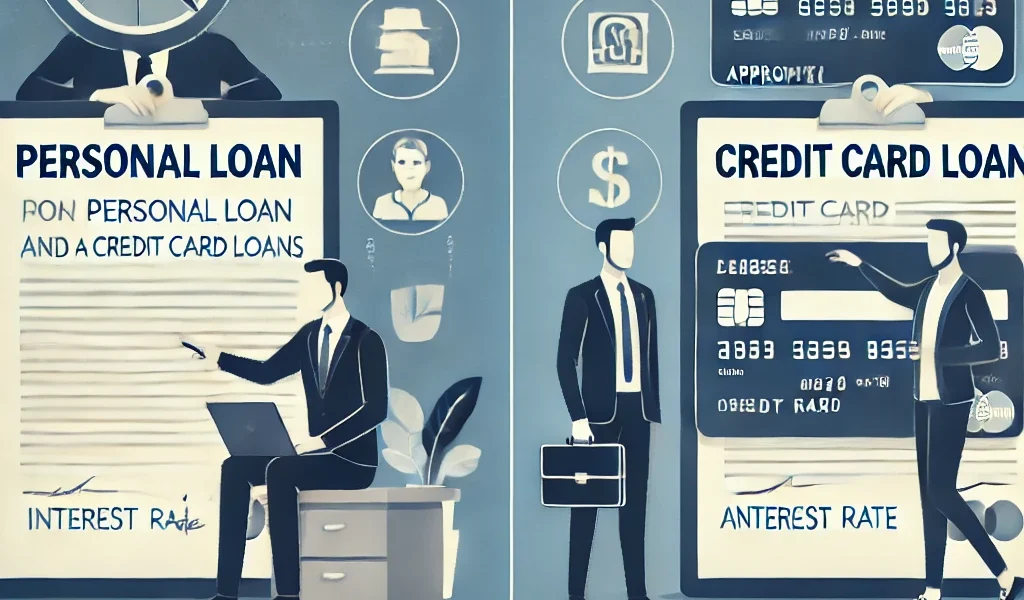When you need quick access to funds, two common options are personal loans and credit card loans. Both can provide financial relief in emergencies, cover large expenses, or consolidate debt. However, choosing the right one depends on various factors such as interest rates, repayment terms, eligibility, and overall financial goals.
In this article, we’ll compare personal loans and credit card loans to help you determine which option is better suited for your needs.
What Is a Personal Loan?
A personal loan is a lump sum amount borrowed from a bank, credit union, or online lender, which is repaid in fixed monthly installments over a specified period (typically 1 to 7 years).
Key Features of Personal Loans:
- Fixed Loan Amount – You receive a lump sum upfront.
- Fixed Interest Rate – Most personal loans have a fixed rate, making repayment predictable.
- Repayment Period – Typically ranges from 1 to 7 years.
- Requires Application & Approval – Based on credit score, income, and financial history.
Pros of Personal Loans:
✔ Lower interest rates than credit card loans (if you have good credit).
✔ Predictable monthly payments with fixed terms.
✔ Higher borrowing limits compared to credit card loans.
✔ Can be used for various purposes (debt consolidation, home improvements, medical bills, etc.).
Cons of Personal Loans:
✖ Requires a good credit score for the best rates.
✖ May have origination fees and prepayment penalties.
✖ Approval process can take a few days.
What Is a Credit Card Loan?
A credit card loan allows you to borrow against your available credit limit, either through cash advances or balance transfers. Some credit card issuers also offer structured installment plans for large purchases.
Key Features of Credit Card Loans:
- Revolving Credit – Borrow up to your credit limit and repay as needed.
- Higher Interest Rates – Credit card loans generally have higher interest than personal loans.
- Minimum Monthly Payments – You can pay a small percentage of your balance but will incur interest.
- Immediate Access to Funds – No lengthy approval process.
Pros of Credit Card Loans:
✔ No additional loan application or approval required.
✔ Flexible repayment – you can pay off as much or as little as needed.
✔ Ideal for short-term borrowing and emergencies.
✔ May offer promotional 0% APR periods.
Cons of Credit Card Loans:
✖ Higher interest rates, often exceeding 20% APR.
✖ Minimum payments may lead to prolonged debt cycles.
✖ Cash advances usually have additional fees.
✖ Overutilization of credit can hurt your credit score.
Comparing Personal Loans & Credit Card Loans
| Feature | Personal Loan | Credit Card Loan |
|---|---|---|
| Loan Amount | Higher loan amounts | Limited to credit card limit |
| Interest Rate | Lower (typically 6%-15% APR) | Higher (15%-25% APR or more) |
| Repayment Period | Fixed term (1-7 years) | Revolving (no fixed end date) |
| Approval Process | Requires application & credit check | No new application required |
| Best For | Large expenses, debt consolidation | Short-term borrowing, emergencies |
| Impact on Credit Score | Can help build credit if paid on time | High credit utilization can lower score |
Which Loan Option is Better for You?
Choose a Personal Loan If:
✔ You need a larger loan amount for a planned expense.
✔ You prefer fixed interest rates and structured repayment.
✔ You want to consolidate high-interest debt.
✔ You have a good credit score and can qualify for a low-interest loan.
Choose a Credit Card Loan If:
✔ You need quick access to funds for short-term expenses.
✔ You can take advantage of a 0% APR promotion.
✔ You prefer flexible repayment without a fixed term.
✔ You only need to borrow a small amount.
Final Verdict: Personal Loan vs. Credit Card Loan
Both personal loans and credit card loans have their advantages and disadvantages. If you need a larger sum with lower interest and fixed payments, a personal loan is the better choice. If you need quick, flexible access to funds, a credit card loan may be more convenient.
Before making a decision, carefully evaluate your financial situation, repayment ability, and the total cost of borrowing. Always read the terms and conditions to avoid hidden fees and high interest charges.
Disclaimer: Loan terms and interest rates vary by lender. Always consult with a financial advisor or lender before taking a loan.




